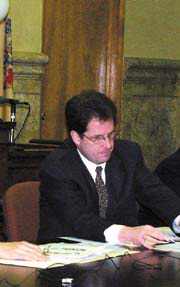After a public hearing lasting almost two and a half hours Tuesday, the Union City Board of Commissioners decided to table an ordinance that would force bars and restaurants to stop selling alcohol at 2 a.m. rather than 3 a.m.
While Union City Mayor Brian Stack made it clear that he had not changed his position on the ordinance, he wanted to give the commissioners a chance to think about what was said by members of the public at the meeting.
"Although I have made my opinion on this matter clear, I would like to give the commissioners a chance for further deliberation," said Stack.
The ordinance will be put back on the agenda at a later date that will be decided by the city clerk.
Many bar owners argued that by taking away that hour, the city would be taking away about 25 percent of their gross income.
"There is a truism that there are only so many hours that a liquor establishment is profitable," said Attorney Robert Mayerovic, who is representing three of the liquor establishments in Union City. "If you take away one or two of those hours, that is 20 to 25 percent of their gross revenue."
Mayerovic was referring to the hours from 11 p.m. to closing on Friday and Saturday.
Although the commissioners did not pass the ordinance taking away one hour of business for the liquor establishments, the commissioners did pass an ordinance raising the cost to renew their plenary consumption license by 20 percent.
After the increase, a plenary retail consumption license, or the license obtained by a bar or restaurant, will cost $1,791. A plenary retail distribution license, the license obtained by a liquor or grocery store, will cost $1,433 to renew each year.
Those numbers are up from $1,493 for a consumption license and $1,194 for a distribution license.
Are the bars responsible?
This ordinance was introduced to improve the quality of life in the city. According to Stack and the board of commissioners, closing the bars one hour earlier will put an end to public drinking, public urination and large groups from forming on the streets. Stack cited the spike in police calls from 1:30 a.m. to 3:30 a.m.
"There was one night that we did a sweep and handed out 70 or 80 summonses for public drinking," said Stack. "As the mayor of this city, I am not proud to say that."
One resident living on Manhattan Avenue, near the Spot tavern, told the commissioners he is happy with the ordinance.
"I am repeatedly woken up at 3 a.m.," said Vincent Cirillo, who wakes up every morning at 6 a.m. to go to work. "I agree that these owners have to run a business. But they have to run a responsible business."
Cirillo also cited instances where his brothers and girlfriend’s cars had received more than $1,000 in damage due to the nightclub on the corner.
But should the bars be responsible for this behavior? One resident did not think so.
"If you close the bars one hour earlier, then the calls will start coming in from 12:30 a.m. to 2:30 a.m.," said a resident. "How do you ensure that this will work?"
"The person who is urinating on the street at 2:30 a.m. will urinate on the street at 12 a.m. or 10 p.m.," said Rafael Fernandez, owner of Club Monty in Union City.
In the past, Stack has noted that in neighboring West New York, bars close at 2 a.m.
Coming up with an alternative
Stack and the Board of Commissioners listened to many speakers who lobbied to have the ordinance tabled to a later date.
"I request that you do not act on this ordinance tonight," said Mayerovic who was only retained by the bar owners the day before the hearing, adding that a voluntary solution would be better in this situation. "This ordinance, percentage-wise, represents a significant number of hours to the bar owners. I would like to present an alternative. There may be another method to deal with these concerns."
Ramiro Franco, the president of the Union City Bar and Restaurant Association, provided the city with an alternative plan to closing the bars one hour earlier.
As part of the Association’s plan, Franco said that all bar owners would be at their place of business or have someone else with authority be there at all times. Franco also proposed either hire a police officer or professional security company to be on the premises as needed, also adding an extra hour to security to disperse and control any groups lingering outside the establishment. Franco also proposed strictly enforcing the one-way door policy already in effect. This policy does not allow any bar or restaurant to allow new patrons into the establishment after 2 a.m.
However, Stack criticized these plans, saying that they would not do enough to advance the city’s aim. The second hearing and final adoption date for this ordinance has not been announced yet.
